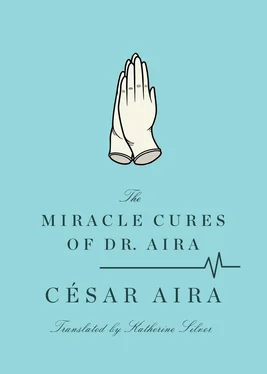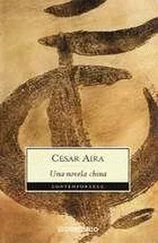Given these characteristics of Dr. Aira’s method, the publication would have to be encyclopedic. And although the word “Encyclopedic” should never be written down, the open-ended and infinite totality of installments was nothing but a general and complete Encyclopedia. Therein lay the secret of the Cures, the secret he was aiming for, and therein lay the key to his entire enterprise: to give it maximum visibility.
Seen from this angle — as the penning of an Encyclopedia of all things from all times — the work revealed itself as the ascetic practice of a Superman. . There was so much to do! His life would have to last a thousand years. . One of the ideas he had discarded in the course of his fanciful planning was to adapt the format of false publicity brochures selling prepaid access to healers. A lifelong monthly fee would allow members to benefit from a Miracle Cure whenever they might need one. Like all the other projects he was enthusiastic about briefly then dropped as soon as cold reason snuffed out the flames of his fantasy, this one had not passed without leaving its mark. Everything fit into the text, which was made of marks, and not only human marks.
Basically, the discipline of writing consisted of limiting oneself to writing, to that work, with all its parsimony, its periodicity, its use of time. It was the only way to quell the anxiety that could otherwise overwhelm him, anxiety due to the immeasurable and self-propagating nature of the things that filled the world and continued to emerge each and every step of the way. There was a contrast, which could be defined as “curative,” between the constant periodicity of writing, which was always a partial process, and the totality of the present and of eternity.
For many years it had been Dr. Aira’s habit to write in cafés, of which, fortunately, there were many in the Flores neighborhood. This unfortunate habit had combined with several practical imperatives until, during this period, he couldn’t write a single line unless he was sitting at a table at one of those hospitable establishments. The viciousness with which Dr. Actyn carried out his campaign against him put to the test his will to continue to frequent them, for they were public places, accessible to him as well as to his enemies. But he had no choice if he wanted to keep writing. A dark cloud of paranoia began to accompany him during each one of his outings. At moments he felt observed, and with good reason. There were no direct assaults, nor did he expect them. But indirect ones could take many forms, and during these writing sessions on the Camino Real or on Miraflores or San José streets, anything could happen, or could be happening without him noticing, while one of his frequent raptures of inspiration was isolating him from his surroundings. He was certain that Actyn could recruit any type of human, any formulation of the human, for his operations of vigilance and provocation; hence it was not a question of recognizing his adversary by his looks. . He could not even say, just by looking, if somebody was observing him, because in a café it is easy to sit in a strategic position, avert the eyes, or stare at a reflection — dissemble in a thousand ways. He had developed at least one sure method for finding out if somebody was observing him: it consisted of yawning while secretly spying on the one he suspected; if he yawned in turn, it meant his eyes had been on him, because the contagious property of yawns is infallible. Of course, somebody who just happened to be looking at him at that moment might have yawned; and anyway, proof didn’t do him much good, though at least he knew what to expect, which was enough for him.
Among the “practical imperatives” that forced him to go elsewhere to write was his wife’s superstitious disdain for his intellectual activities, disdain that had been slowly turning into horror ever since Dr. Actyn had mobilized the mass media in his campaign to destroy his prestige. More and more frequently she made a fuss, complaining that people recognized her, that they stared and pointed; she claimed that soon she would be too ashamed to leave her house. . She said it didn’t bother him because he could always pick up and leave, as had so many other husbands who had gotten carried away. It didn’t take much, not even an increase in hysteria. All a sweet young thing had to do was walk past him and he’d fall in love. . In fact, he wanted to love. His poor health no longer seemed like an obstacle. In fact, he wanted to love in sickness; suddenly this seemed to be the only true love.
Thinking about this, he asked himself a question: Why hadn’t Dr. Actyn, who had tried his hand at so many options, ever considered tempting him with a woman? He had set him so many traps that were so baroque, so elaborate, sometimes quite absurd. . but never the simplest and most classic. It couldn’t be due to ethical qualms, because he had done much worse things. Was this not, then, the decisive proof of reality? How could he possibly have failed to take that into account? Did he have too much respect for him? Did he consider him above such temptations? If so, how wrong he was! Because Dr. Aira’s thirst for love made this the temptation he was most likely to succumb to. He was perfectly capable of falling into that trap, even if he knew it to be a trap, because he trusted in the power of love. Would it not have been the perfect romance, the valiant adventure that would make manifest all his fantasies in the material world? In fact, he thought that losing that battle would be the same as winning the war. But for some incomprehensible reason, Actyn had abstained from attacking him along that flank. Did he fear that the missile of love would end up piercing him? Or was he saving it for when all else had failed?
Without love, Dr. Aira was condemned to perpetual installments. . But he had to think positively and concentrate specifically on the practical aspects. With the arrival of the winter solstice, he felt he had reached the point of no return. He should already be making models of the installments, drawing the diagrams, choosing the typeface, the paper. . They would be installments, that was settled. . But in hardcover. He could be reasonable, but not to such an extent; some of his madness must survive. He had considered a thick, very stiff cardboard for the covers that would make a nice contrast with the small number of pages they would contain, though he still hadn’t decided if there would be four or eight, but no more than that.
Nor had he figured out the costs. He would, needless to say, have to spend the minimum amount possible; in fact, he couldn’t talk about “costs” because there would be nothing to offset them, that is, against which to measure them. The project didn’t include selling the installments; to do that he would have to set up a company, register as a publisher, pay value-added tax, and a thousand other things he would never dream of doing. He would give them away; nobody could stop him from doing that.
The ideal thing would have been to operate with a dual monetary system, such as the one in Ancient China. There, they had official money for ordinary citizens and another for the poor, who were, of course, the vast majority of the population. The connection between the two, which never played out in reality, consisted of dividing the smallest unit of the official money — let’s say, a cent — into ten thousand units; that multiple was the sapek , the basic unit in the poor people’s system. A fistful of watermelon seeds cost a sapek . All business in the impoverished sectors was conducted with this money; the poor, the peasants, and children used no other, and these humble transactions met their survival needs. There was never any “exchange” because who would ever collect a million sapeks to exchange for one “cent” of the official money, a unit that had, on the other hand and on another level of life, a minute value, not even enough to pay for the cheapest item in a store, or the simplest dish in a restaurant? Whereas with much less money than that — under certain circumstances, a mere hundred sapeks ! — a poor person could pay an entire month’s food, shelter, and all other necessities. And everybody was happy and well fed.
Читать дальше












